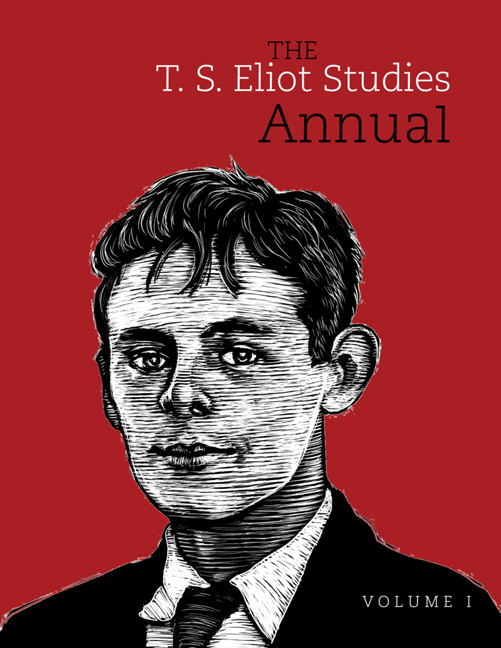Book contents
- Frontmatter
- Contents
- Abbreviations of Works
- General Editor's Note
- The Short and Surprisingly Private Life of King Bolo: Eliot's Bawdy Poems and Their Audiences
- Dull Tom-Tom's Absurd Prelude: Ludic Modernism in Early T. S. Eliot
- Eliot at Bergson's Lectures, 1910–1911
- The American Legacy of “Prufrock”
- Poetry (June 1915)
- The Stale Dregs of Revolt
- Prufrock, Belated
- Eliot's Allusive Legacy and Obscurity in “Prufrock”
- Transmuting F. H. Bradley: T. S. Eliot's Notes Towards a Theory of Poetry
- T. S. Eliot, Phenomenologist
- Astride the Dark Horse: T. S. Eliot and the Lloyds Bank Intelligence Department
- Aristophanic Structures in Sweeney Agonistes, “The Hollow Men,” and Murder in the Cathedral
- Eliot and Virgil in Love and War
- T. S. Eliot Bibliography 2014
- Notes on Contributors
Prufrock, Belated
- Frontmatter
- Contents
- Abbreviations of Works
- General Editor's Note
- The Short and Surprisingly Private Life of King Bolo: Eliot's Bawdy Poems and Their Audiences
- Dull Tom-Tom's Absurd Prelude: Ludic Modernism in Early T. S. Eliot
- Eliot at Bergson's Lectures, 1910–1911
- The American Legacy of “Prufrock”
- Poetry (June 1915)
- The Stale Dregs of Revolt
- Prufrock, Belated
- Eliot's Allusive Legacy and Obscurity in “Prufrock”
- Transmuting F. H. Bradley: T. S. Eliot's Notes Towards a Theory of Poetry
- T. S. Eliot, Phenomenologist
- Astride the Dark Horse: T. S. Eliot and the Lloyds Bank Intelligence Department
- Aristophanic Structures in Sweeney Agonistes, “The Hollow Men,” and Murder in the Cathedral
- Eliot and Virgil in Love and War
- T. S. Eliot Bibliography 2014
- Notes on Contributors
Summary
Prufrock” is justly celebrated as a revolutionary poem. But as I was rereading John Berryman's claim—in “Prufrock's Dilemma” (1960)—that modern poetry begins with its famously jarring third line, I found myself wondering: What about the first couplet? Did the revolution in modern poetry arrive two lines late? Though it was mostly facetious, this question did get me thinking about the surprising number of ways in which “Prufrock” is, in fact, a late poem—in terms of antecedents, biography, and publication—as well as a poem that is obsessed with lateness.
First, there is the question of antecedents: “Prufrock” is a revolutionary modernist poem, but it is also uncontestably a late decadent poem, filled with the themes, mood, and imagery of fin de siecle works by W. E. Henley, Swinburne, Wilde, Davidson, Symons, and others. And of course, a defining feature of decadence is its intensely selfconscious lateness.
Then, there is the question of publication. Pound was famously relieved in 1914 at finding Eliot so far ahead of his contemporaries, but his evidence for this estimation was a poem that had been written four years before. It's worth noting that Pound had just barely ceased to compose his own (self-described) “stale cream-puffs” in the Pre-Raphaelite manner. Harriet Monroe wasn't exactly struck blind by the manuscript's novelty either; she received it in October 1914 but didn't publish it until June of the following year, and even then with reluctance in several regards. Eliot himself sensed the poem's lateness. He believed that it was his swan song; he feared that he was already late in his own career and would never compose anything to match it. By 1915, his imagination was closer to F. H. Bradley than to J. Alfred Prufrock, and there is much in Eliot's graduate work on Bradley's philosophy to suggest that “lateness” is not accidental but rather an essential part of being conscious. We encounter everything, Bradley suggests, in the non-relational state of immediate experience, which necessarily breaks up into relations and points of view; it's part of the nature of consciousness, in Bradley's sense, to be late, to have missed the moment. And most of our lives are spent in the attempt to recapture that moment in a later state of transcendent unity.
- Type
- Chapter
- Information
- The T. S. Eliot Studies Annual , pp. 89 - 92Publisher: Liverpool University PressPrint publication year: 2017



